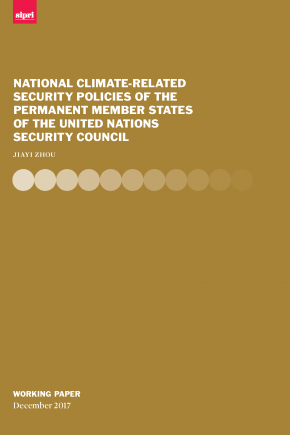National Climate-related Security Policies of the Permanent Member States of the United Nations Security Council
Over the past decade, climate change has become increasingly embedded within global security discourse, but whether it should be formally considered as a matter for the international peace and security agenda remains contested. Moreover, while the adverse effects of climate change on natural, societal and governance systems clearly amounts to a threat that is transnational in scope, the international response remains dependent on positions taken at a national level. The United Nations Security Council represents a key forum and lens into this debate, within which national governments’ positions on climate security continue to diverge.
As background context to this debate, this paper traces the national climate-related security policies of five key UN Security Council states: China, Russia, the United States, the United Kingdom and France—the permanent members (or the P5) holding veto power. Specifically, it examines how more traditional security actors within each country have assessed the risk of climate change on national security, and the extent to which they have organizationally begun to incorporate any identified climate risks into their plans and operations.
1. Introduction
2. China
3. Russia
4. The United States
5. The United Kingdom
6. France
7. Conclusions

